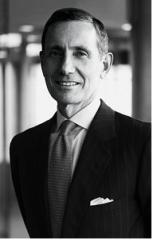
With Caffray’s hiring, it is likely a decision will be announced soon. Robertson could choose to create a fund of funds comprised of some or all of the seeds, or aggressively ramp up the marketing of the seeds individually. There was also some speculation that he even might try to sell a minority interest to a major financial institution as long as it meets the new rules under Dodd-Frank. However, this option seems less likely with Caffray’s arrival.
Caffray will become the seventh member of Tiger’s management committee, joining Robertson, Townsend, Alex Robertson, Aaron Stern, Stacy Dick and general counsel Michael Treisman.
Caffray was Tiger’s head trader for eight years during the 1990s before leaving in 2000 to co-found FrontPoint Partners LLC. FrontPoint was acquired by Morgan Stanley Investment Management in December 2006. Caffray eventually left and became chief executive officer of Touradji Capital Management, which was founded by Paul Touradji, who worked at Tiger from 1996 to 2000 and eventually became a Managing Director in the Commodities and Basic Resources Group.
Tiger Management is an investor in Touradji’s funds, and Touradji is located in the same offices as Tiger. Under the deal with Tiger, Caffray—who is just moving three offices down the hall--will remain a special advisor to Touradji.
Robertson created a hedge fund firm that reached $26 billion in assets by 1998. His flagship fund compounded at 31.5 percent gross from 1980 through 2000, when he closed down the fund when his tech and dot-com shorts didn’t work out during the bubble and his fickle investors starting bailing out. During the 1990s Robertson along with George Soros and Michael Steinhardt were the hedge fund industry’s standard bearers.
Robertson seeded his first four funds in 2000 and 2001 with people already on his payroll. Today he has about 40 with roughly $22 billion in assets under management.The two most famous seeds are Tiger Global’s Chase Coleman and Tiger Asia’s Bill Hwang.
By the end of 2007, Coleman’s Tiger Global, a long/short equity fund, had grown to more than $6 billion, with a seven-year annualized return of approximately 44 percent. Hwang’s Tiger Asia, a specialist in Asian securities, had $8 billion — and a 40.4 percent annualized return.
But since then the pair has stumbled a bit. Coleman lost 26 percent in 2008 and 1 percent in 2009. Through the first nine months of last year, however, he gained more than 9 percent. Still, his assets had dropped by about one third to about $4 billion.
Hwang finished down 23 percent in 2008 and was up just 3 percent the following year when the global markets sharply rebounded. In the first three quarters of 2010, he was down about 0.2 percent after losing more than 6 percent in the September period. Today he manages only $3.8 billion, less than half of that at his peak. In fact, a number of the seeds had mediocre years in 2009, when they failed to embrace the market’s swift recovery.
There certainly is interest in the seeds. Back in July, Goldman Sachs’ prime brokerage hosted its one and only Tiger Management–themed capital-introduction event in which 27 Tiger Seeds participated and approximately 300 allocators attended. The group of seeds included new managers that have launched funds in the last few years as well as some of the more established managers on the platform. Robertson and Goldman Sachs managing director Gerald Corrigan spoke and answered questions during lunch. “The event was very well received by investors,” a Goldman spokesman told me several months ago. “We had a packed house.”
With the markets recovering in general and investors warming up to hedge funds again, it looks like Robertson’s timing is good to pack a bunch more investment bank houses.







